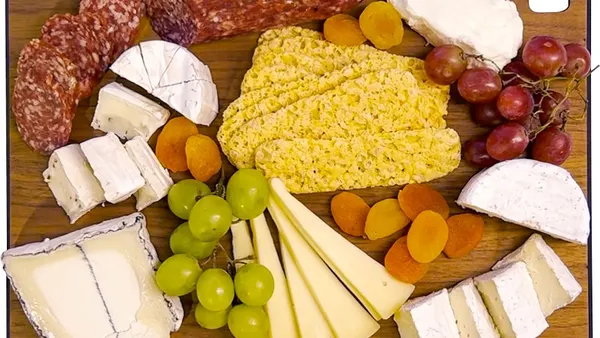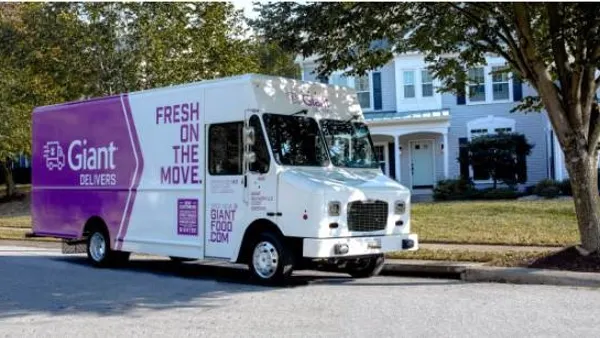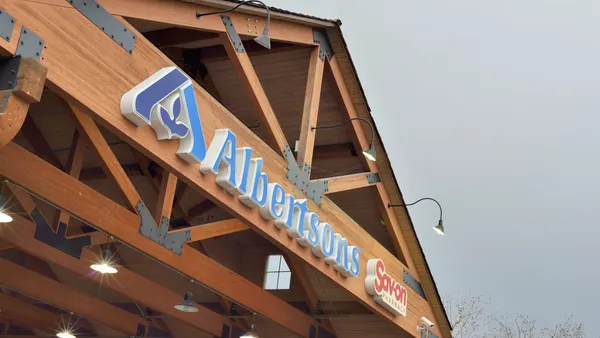Dive Brief:
- Sales of Blue Apron meal kits at Costco are being "paused" during the holiday season, the beleaguered supplier said during a recent earnings call. Blue Apron first started selling at the wholesaler in May.
- Blue Apron CEO Brad Dickerson said Costco wants more shelf space to sell other food items that do better during the holiday season. There is "lower engagement in our type of product during the holidays," Dickerson said. "[Costco has] certain holiday offerings and they need shelf space for their holiday offerings."
- The maker of pre-portioned meal kits said the company is aiming to return to Costco in 2019. Until then, Blue Apron will work on its packaging and improve its product mix depending on the region of the country and the logistics of transitioning from one recipe to another. Dickerson said the company is also working on partnerships with other retailers.
Dive Insight:
As Blue Apron's traditional meal kit business has struggled, the company has worked to expand its reach into traditional retailers in a bid to broaden its brand and tap into another sales avenue. Last month, it announced a partnership with Walmart's Jet.com, and Dickerson said recently that Blue Apron is talking with other retailers.
Costco's decision to stop selling Blue Apron meal kits — even temporarily — can't be good news for the beleaguered company. If Blue Apron does return to Costco in 2019 as it is hoping, who's to say that Costco won't decide to pull the plug again in favor of other faster-selling items? The decision this time around could be harmful to Blue Apron as it tries to get more consumers in stores to learn about the company, and perhaps incorporate it into their weekly food consumption habits or to complement delivery of the meal kits to their homes.
Blue Apron said meal kits sales tend to slow during the holidays. It's possible that consumers are too busy eating out or dining with friends and family, meaning they are spending less time at home and don't have as great of a demand for meal kits. Presumably, Blue Apron and Costco would have known sales would slow during this time of the year and would have factored in a decline, but the drop may have been more than forecast.
Recent data, however, contradicts Blue Apron's claim, indicating there could be deeper issues with the partnership. According to data from Captify, a search intelligence company, searches for "Blue Apron" were 188 times higher during the one-month period spanning October 1 to November 8 compared to same period a year ago. The company led consumer searches among meal kit companies. Meanwhile, searches for meal kits overall rose by 2,000%.
Dickerson admitted there's room for improvement. He told analysts the pilot with Costco has taught Blue Apron that there needs to be "some pretty decent product innovation specifically focused on how can we put products out there to leverage the strength of our brand." In addition, he said some recipes caught on in certain regions but weren't as successful in others.
It's evident that Blue Apron needs to create additional products to keep its brand fresh and grow its base, while tailoring meal kits depending on the area and the customer. All this, of course, costs money, which gets to the crux of the company's problems. Even in a promising new sales channel, growth comes at a steep price.
Regardless, Blue Apron is losing out on a prime opportunity to engage with consumers during a busy time of the year. The greater liability is that the challenges with Costco carry over into other retailer relationships. If Blue Apron can't establish a solid presence in stores to offset the difficulties it is facing with its direct-to-consumer model — which has faced mounting losses, jobs cuts, high marketing expenses and an exodus of customers — that could prove fatal to the meal kit pioneer.










